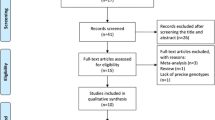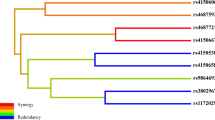Abstract
The current large-scale meta-analysis was performed to reach a reliable conclusion on the association between X-ray repair cross-complementing 1 (xrcc1) rs1799782 and the development of lung cancer. Studies that investigated the association between rs1799782 and lung cancer risk were identified by searching PubMed. We calculated odds ratio (OR) with corresponding 95 % confidence interval (CI) for Trp/Trp vs Arg/Arg, Trp/Trp + Arg/Trp vs Arg/Arg, and Trp/Trp vs Arg/Trp + Arg/Arg contrast models. Combining all 25 studies, we yielded three summary ORs: 1.07 (95 % CI 0.92–1.23) for Trp/Trp vs Arg/Arg, 0.93 (95 % CI 0.87–1.00) for Trp/Trp + Arg/Trp vs Arg/Arg, and 1.08 (95 % CI 0.94–1.25) for Trp/Trp vs Arg/Trp + Arg/Arg, suggesting rs1799782 was not associated with overall risk of lung cancer. Strikingly, a significantly deceased risk was found among Caucasian populations (Trp/Trp + Arg/Trp vs Arg/Arg, OR = 0.86, 95 % CI 0.76–0.97). This study confirms that xrcc1 rs1799782 may lower the risk of lung cancer among Caucasians.



Similar content being viewed by others
References
Khuder, S. A. (2001). Effect of cigarette smoking on major histological types of lung cancer: a meta-analysis. Lung Cancer, 31(2–3), 139–148.
Doll, R., & Peto, R. (1981). The causes of cancer: quantitative estimates of avoidable risks of cancer in the United States today. Journal of the National Cancer Institute, 66(6), 1191–1308.
Doll, R., et al. (2004). Mortality in relation to smoking: 50 years’ observations on male British doctors. BMJ, 328(7455), 1519.
Hecht, S. S. (1999). Tobacco smoke carcinogens and lung cancer. Journal of the National Cancer Institute, 91(14), 1194–1210.
Livneh, Z. (2001). DNA damage control by novel DNA polymerases: translesion replication and mutagenesis. Journal of Biological Chemistry, 276(28), 25639–25642.
Li, D., et al. (2001). Sensitivity to DNA damage induced by benzo(a)pyrene diol epoxide and risk of lung cancer: a case-control analysis. Cancer Research, 61(4), 1445–1450.
Hoeijmakers, J. H. (2001). Genome maintenance mechanisms for preventing cancer. Nature, 411(6835), 366–374.
Wood, R. D., et al. (2001). Human DNA repair genes. Science, 291(5507), 1284–1289.
Whitehouse, C. J., et al. (2001). XRCC1 stimulates human polynucleotide kinase activity at damaged DNA termini and accelerates DNA single-strand break repair. Cell, 104(1), 107–117.
Caldecott, K. W. (2003). XRCC1 and DNA strand break repair. DNA Repair (Amst), 2(9), 955–969.
Shen, M. R., Jones, I. M., & Mohrenweiser, H. (1998). Nonconservative amino acid substitution variants exist at polymorphic frequency in DNA repair genes in healthy humans. Cancer Research, 58(4), 604–608.
Wei, B., et al. (2011). XRCC1 Arg399Gln and Arg194Trp polymorphisms in prostate cancer risk: a meta-analysis. Prostate Cancer and Prostatic Diseases, 14(3), 225–231.
Gsur, A., et al. (2011). No association of XRCC1 polymorphisms Arg194Trp and Arg399Gln with colorectal cancer risk. Cancer Epidemiology, 35(5), e38–e41.
Chen, B., et al. (2012). Polymorphisms of XRCC1 and gastric cancer susceptibility: a meta-analysis. Molecular Biology Reports, 39(2), 1305–1313.
Shen, W. D., Chen, H. L., & Liu, P. F. (2011). XRCC1 Polymorphisms and Pancreatic Cancer: A Meta-Analysis. Chinese Journal of Cancer Research, 23(3), 165–170.
Zhang, H., et al. (2011). Polymorphisms in DNA repair gene XRCC1 and skin cancer risk: a meta-analysis. Anticancer Research, 31(11), 3945–3952.
De Ruyck, K., et al. (2007). Polymorphisms in base-excision repair and nucleotide-excision repair genes in relation to lung cancer risk. Mutation Research, 631(2), 101–110.
Chen, S., et al. (2002). DNA repair gene XRCC1 and XPD polymorphisms and risk of lung cancer in a Chinese population. Carcinogenesis, 23(8), 1321–1325.
Yin, J., et al. (2008). Haplotypes of nine single nucleotide polymorphisms on chromosome 19q13.2-3 associated with susceptibility of lung cancer in a Chinese population. Mutation Research, 641(1–2), 12–18.
Wang, Y., et al. (2009). Association between X-ray repair cross complementing group 1 codon 399 and 194 polymorphisms and lung cancer risk: a meta-analysis. Cancer Letters, 285(2), 134–140.
Dai, L., et al. (2012). XRCC1 gene polymorphisms and lung cancer susceptibility: a meta-analysis of 44 case-control studies. Molecular Biology Reports, 39(10), 9535–9547.
Tobias, A. (1999). Assessing the influence of a single study in the meta-analysis estimate. Stata Technical Bulletin, 8, 15–17.
Egger, M., et al. (1997). Bias in meta-analysis detected by a simple, graphical test. BMJ, 315(7109), 629–634.
Mantel, N., & Haenszel, W. (1959). Statistical aspects of the analysis of data from retrospective studies of disease. Journal of the National Cancer Institute, 22(4), 719–748.
DerSimonian, R., & Laird, N. (1986). Meta-analysis in clinical trials. Controlled Clinical Trials, 7(3), 177–188.
Guo, S., et al. (2013). The relationship between XRCC1 and XRCC3 gene polymorphisms and lung cancer risk in northeastern Chinese. PLoS ONE, 8(2), e56213.
Wang, N., Wu, Y., & Zhou, X. (2012). Association between genetic polymorphism of metabolizing enzymes and DNA repairing enzymes and the susceptibility of lung cancer in Henan population. Wei Sheng Yan Jiu, 41(2), 251–256.
Buch, S. C., et al. (2012). Genetic variability in DNA repair and cell cycle control pathway genes and risk of smoking-related lung cancer. Molecular Carcinogenesis, 51(Suppl 1), E11–E20.
Janik, J., et al. (2011). 8-Oxoguanine incision activity is impaired in lung tissues of NSCLC patients with the polymorphism of OGG1 and XRCC1 genes. Mutation Research, 709–710, 21–31.
Tanaka, Y., et al. (2010). Nonsynonymous single nucleotide polymorphisms in DNA damage repair pathways and lung cancer risk. Cancer, 116(4), 896–902.
Chang, J. S., et al. (2009). Base excision repair genes and risk of lung cancer among San Francisco Bay Area Latinos and African-Americans. Carcinogenesis, 30(1), 78–87.
Improta, G., et al. (2008). Polymorphisms of the DNA repair genes XRCC1 and XRCC3 and risk of lung and colorectal cancer: a case-control study in a Southern Italian population. Anticancer Research, 28(5B), 2941–2946.
Li, M., et al. (2008). XRCC1 polymorphisms, cooking oil fume and lung cancer in Chinese women nonsmokers. Lung Cancer, 62(2), 145–151.
Pachouri, S. S., et al. (2007). Contrasting impact of DNA repair gene XRCC1 polymorphisms Arg399Gln and Arg194Trp on the risk of lung cancer in the north-Indian population. DNA and Cell Biology, 26(3), 186–191.
Matullo, G., et al. (2006). DNA repair polymorphisms and cancer risk in non-smokers in a cohort study. Carcinogenesis, 27(5), 997–1007.
Zienolddiny, S., et al. (2006). Polymorphisms of DNA repair genes and risk of non-small cell lung cancer. Carcinogenesis, 27(3), 560–567.
Landi, S., et al. (2006). DNA repair and cell cycle control genes and the risk of young-onset lung cancer. Cancer Research, 66(22), 11062–11069.
Hao, B., et al. (2006). A novel T-77C polymorphism in DNA repair gene XRCC1 contributes to diminished promoter activity and increased risk of non-small cell lung cancer. Oncogene, 25(25), 3613–3620.
Chan, E. C., et al. (2005). Polymorphisms of the GSTM1, GSTP1, MPO, XRCC1, and NQO1 genes in Chinese patients with non-small cell lung cancers: relationship with aberrant promoter methylation of the CDKN2A and RARB genes. Cancer Genetics and Cytogenetics, 162(1), 10–20.
Schneider, J., et al. (2005). XRCC1 polymorphism and lung cancer risk in relation to tobacco smoking. International Journal of Molecular Medicine, 16(4), 709–716.
Shen, M., et al. (2005). Polymorphisms in the DNA base excision repair genes APEX1 and XRCC1 and lung cancer risk in Xuan Wei, China. Anticancer Research, 25(1B), 537–542.
Hu, Z., et al. (2005). A promoter polymorphism (−77T > C) of DNA repair gene XRCC1 is associated with risk of lung cancer in relation to tobacco smoking. Pharmacogenetics and Genomics, 15(7), 457–463.
Hung, R. J., et al. (2005). Large-scale investigation of base excision repair genetic polymorphisms and lung cancer risk in a multicenter study. Journal of the National Cancer Institute, 97(8), 567–576.
Ratnasinghe, D., et al. (2001). Polymorphisms of the DNA repair gene XRCC1 and lung cancer risk. Cancer Epidemiology, Biomarkers & Prevention, 10(2), 119–123.
David-Beabes, G. L., & London, S. J. (2001). Genetic polymorphism of XRCC1 and lung cancer risk among African-Americans and Caucasians. Lung Cancer, 34(3), 333–339.
Spitz, M. R., et al. (2003). Genetic susceptibility to lung cancer: the role of DNA damage and repair. Cancer Epidemiology, Biomarkers & Prevention, 12(8), 689–698.
Lunn, R. M., et al. (1999). XRCC1 polymorphisms: effects on aflatoxin B1-DNA adducts and glycophorin A variant frequency. Cancer Research, 59(11), 2557–2561.
Sutton, A. J., et al. (2000). Empirical assessment of effect of publication bias on meta-analyses. BMJ, 320(7249), 1574–1577.
Acknowledgments
This work was supported by the National Science Foundation of China (NSFC No. 81372827).
Author information
Authors and Affiliations
Corresponding author
Rights and permissions
About this article
Cite this article
Wang, H., Liu, Z. Polymorphism of DNA Repair Gene xrcc1 and Lung Cancer Risk. Cell Biochem Biophys 70, 1881–1886 (2014). https://doi.org/10.1007/s12013-014-0146-7
Published:
Issue Date:
DOI: https://doi.org/10.1007/s12013-014-0146-7




